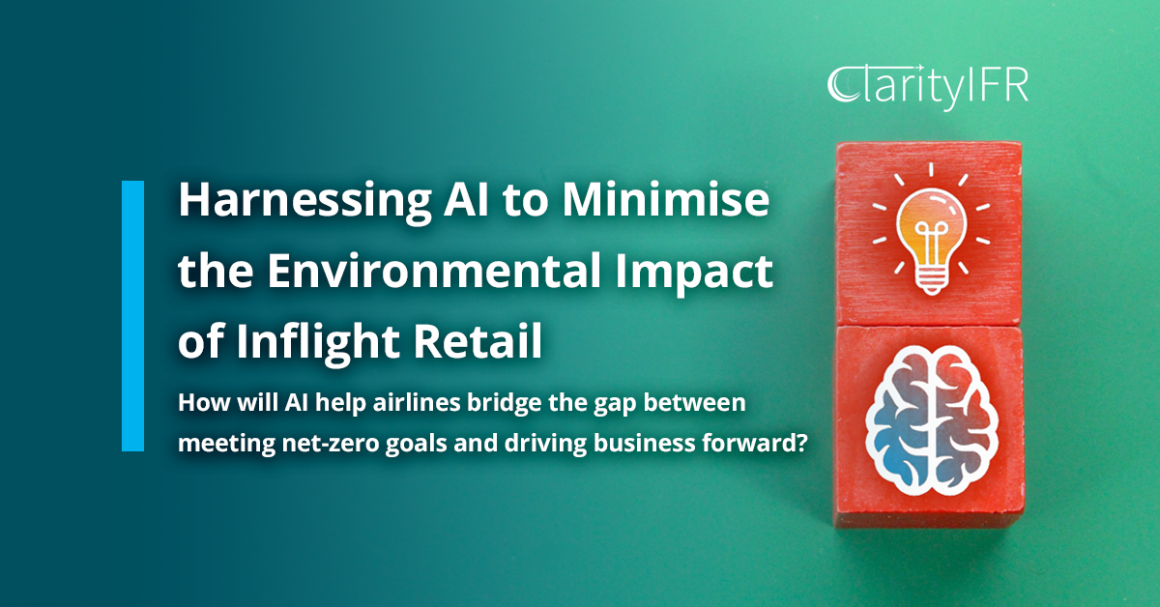How will Artificial Intelligence (AI) help airlines bridge the gap between meeting net-zero goals and driving business forward to improve inflight retail experiences?
Airlines play a crucial role in exacerbating global carbon emissions, with each flight releasing up to 250,000 pounds of carbon dioxide. To reduce its environmental impact, airlines are harnessing the power of AI as an exclusive resource to make smarter and more sustainable choices.
From an airline perspective, making sustainable informed decisions goes beyond simply urging travellers to fly less. It involves strategic measures such as reducing inventory to minimise stock wastage and weight onboard, which directly impacts business targets. This is how AI emerges as a game-changer in the realm of inflight retail. By leveraging AI-driven solutions, airlines can create a more enticing onboard experience that encourages passengers to spend more while airlines prepare to spend less. It’s a win-win situation, enabling airlines to enhance revenue generation while prompting sustainable practices.
Many of the world’s leading airlines are exploring AI capabilities, with many leading the way in implementing AI-driven retail that aligns with the evolving expectations of customers – with more and more transitioning into this mindset.
AI is becoming a circuit breaker for aviation. Global AI adoption in the aviation market is expected to increase in value from $152.4 million in 2018 to an estimated $2,222.5 million by 2025. As this continues to reshape the industry, how exactly might AI influence economic growth and contribute to airlines’ global ambition to reduce future emissions?
Afterall, sustainability is turning into a revenue-driven business model following a surge of consumer awareness regarding companies’ operational practices influencing their purchasing decisions, as well as being tailored to consumers individual requirements, plus, investors are increasingly interested in adopting sustainable practices to reduce risks.
It seems AI is a crucial element that helps to improve the situation, from influencing the supply-chain, to boosting fuel management – which is a key focus of sustainability for the industry and can be a huge cost saver, as fuel is one of the largest expenses in the sector.
Eating a sandwich with a cup of coffee while enjoying the passing clouds is how many of us imagine an airplane journey. Behind-the-scenes, supply management specialists define how many snacks and drinks must be packed to transfer onboard without being wasteful.
Airlines must know how to predict the amount of food and drink supply it must buy for a specific flight. While food isn’t expensive, every cargo load costs money. Preventing scenarios like the “Million Miles Mars Bar,” where overstocked items contribute to avoidable emissions, becomes vital. A single overstocked item can result in approximately 0.21 tonnes of carbon dioxide emissions.
AI enables systems to be better productive for the economy and for the climate. By optimising conversion rates through tailored and dynamic bar-sets, airlines can enhance profitability while delivering hyper-personalised experiences, leveraging predictive analysis, which considers factors such as demographics, location, and flight destination, enables airlines to determine product demand accurately, reducing waste and onboard weight, and consequently, lowering fuel consumption. Integrated AI-powered solutions that predict seat occupancy rates, analyse passenger profiles, and understand their product preferences for each flight departure are essential. This allows airlines to dynamically respond to passenger demand, minimising unnecessary carbon emissions and ensuring efficient resource utilisation.
Our goal is to implement a zero-waste strategy in line with our commitment towards airlines to dynamically retail and distribute a wide-range of customised offers and orders. By optimising sourcing and loading processes to ensure the right product reaches the right customer, airlines can significantly increase conversion rates, and ultimately long-term loyalty.
Harnessed properly, AI can help ensure a sustainable future for airlines, amid continued rapid technological advances.
If you want to know more about how AI influences the aviation industry, read our guide.

